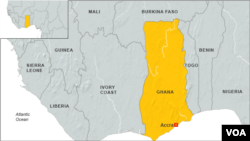ACCRA —
Ghana is planning to build a nuclear plant for much-needed power generation. Not everyone, however, is in favor of the project, which would take eight years to complete.
The country generates power from thermal and other sources but they have become unreliable due to increasing demand for home and industrial use. Add to that, rising crude oil prices pushing up the cost of thermal power generation. Ghana's thermal plants are producing below capacity, a trend likely to impact industrial growth and job creation for Ghanaian youth.
According to Benjamin Nyarko, director general at Ghana’s Atomic Energy Commission, Ghana needs huge amounts of power to realize its goal of becoming industrialized.
“The reality is that we don’t have enough electricity so many companies are down," Nyarko said. "Even now, small companies that use electricity can’t operate. We have to revisit Nkrumah’s vision.”
The dream of Kwame Nkrumah, Ghana’s first president, was to build a nuclear power plant in the 1960’s. That initial plan was shelved, but establishment of the Ghana Atomic Energy Commission, along with the University of Ghana's Graduate School of Nuclear and Allied Sciences, and subsequent introduction of nuclear research reactors laid the groundwork for further investigations. Nyarko said Ghana intends to build upon that foundation and that the International Atomic Energy Agency will provide the necessary assistance.
The non-profit group, Africa Center for Energy Policy, said the government must not use economic indicators alone to determine the viability of the nuclear project. Peter Amewu, the director of policy and research, said the environmental and social costs of the project should be considered because they could have negative implications for the country. He added that nuclear disasters such as the one in Fukushima, Japan two years ago and the one in Chernobyl, Ukraine in 1986 are reasons for concern.
Amewu said developed countries such as Japan, Germany, Russia and France are gradually moving from nuclear power to other sources of renewable energy and Ghana must learn from their example.
“Ghana has huge potential for hydrocarbon in terms of gas, huge potential for renewable in terms of solar; why are we not considering these options but just want to consider nuclear from nowhere?” Amewu asked.
According to development experts, making the right policy decisions is important for much-needed growth for any country. Ghana's parliament is considering a bill on establishing a regulatory body to help operate and finance the initiative.
The country generates power from thermal and other sources but they have become unreliable due to increasing demand for home and industrial use. Add to that, rising crude oil prices pushing up the cost of thermal power generation. Ghana's thermal plants are producing below capacity, a trend likely to impact industrial growth and job creation for Ghanaian youth.
According to Benjamin Nyarko, director general at Ghana’s Atomic Energy Commission, Ghana needs huge amounts of power to realize its goal of becoming industrialized.
“The reality is that we don’t have enough electricity so many companies are down," Nyarko said. "Even now, small companies that use electricity can’t operate. We have to revisit Nkrumah’s vision.”
The dream of Kwame Nkrumah, Ghana’s first president, was to build a nuclear power plant in the 1960’s. That initial plan was shelved, but establishment of the Ghana Atomic Energy Commission, along with the University of Ghana's Graduate School of Nuclear and Allied Sciences, and subsequent introduction of nuclear research reactors laid the groundwork for further investigations. Nyarko said Ghana intends to build upon that foundation and that the International Atomic Energy Agency will provide the necessary assistance.
The non-profit group, Africa Center for Energy Policy, said the government must not use economic indicators alone to determine the viability of the nuclear project. Peter Amewu, the director of policy and research, said the environmental and social costs of the project should be considered because they could have negative implications for the country. He added that nuclear disasters such as the one in Fukushima, Japan two years ago and the one in Chernobyl, Ukraine in 1986 are reasons for concern.
Amewu said developed countries such as Japan, Germany, Russia and France are gradually moving from nuclear power to other sources of renewable energy and Ghana must learn from their example.
“Ghana has huge potential for hydrocarbon in terms of gas, huge potential for renewable in terms of solar; why are we not considering these options but just want to consider nuclear from nowhere?” Amewu asked.
According to development experts, making the right policy decisions is important for much-needed growth for any country. Ghana's parliament is considering a bill on establishing a regulatory body to help operate and finance the initiative.




